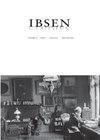Franco Perrelli: On Ibsen and Strindberg: The Reversed Telescope
IF 0.1
0 THEATER
引用次数: 0
Abstract
In his 2015 monograph, Strindberg l’italiano – 130 anni di storia scenica (Edizioni di Pagina, Bari), Franco Perrelli covers the reception of the author in Italy from 1884 (which marks the visit of Strindberg to Italy) to 2014, in a chronological and most comprehensive way. In his recent volume, On Ibsen and Strindberg: The Reversed Telescope, he has published nine articles in English on the reception of either Ibsen or Strindberg, or both. While eight of these essays have been previously published, one of them, “Strindberg in the Italian Nineteenth-Century Theatrical Canon” was presented at the twentieth International Strindberg Conference in Krakow in 2017 and appears in print for the first time (Ch. 6, 65–76). In it Perrelli addresses key factors relating not only to Strindberg, but to theatrical reception at the end of the nineteenth century, in general, including the fame and impact of the actors involved, and the primary importance of the translations and adaptations undertaken for the stagings. Ermete Zacconi (1857–1948), who had gained fame playing Osvald in Ibsen’s Ghosts, played the Captain in The Father, “creating the illusion that his own gaze, voice and gestures were the character’s instead” (as quoted on 67–68, from Zacconi’s obituary in Il dramma in 1948). Perrelli offers a very detailed analysis of changed words (where for instance, “mineralogy” has been translated as “meteorology”, 70), lines and instructions, which proves beyond doubt that these early translations were meticulous adaptations to fit both the stars that staged them and the sensitivities of the receiving culture. Apart from touching upon the accuracy of the early translations, a topic that has not been thoroughly studied in a systematic manner in relation to Strindberg or Ibsen,Franco Perrelli:论易卜生和斯特林堡:反向望远镜
Franco Perrelli在其2015年的专著《意大利史》(Strindberg l’italiano–130 anni di storia scenica)(巴里,Edizioni di Pagina)中,以时间顺序和最全面的方式报道了作者从1884年(这标志着斯特林伯格访问意大利)到2014年在意大利的接待情况。在他最近出版的《论易卜生和斯特林堡:反向望远镜》一书中,他用英语发表了九篇关于易卜生或斯特林堡或两者的接收的文章。虽然其中八篇文章此前已发表,但其中一篇《斯特林堡在意大利十九世纪戏剧经典中》于2017年在克拉科夫举行的第二十届斯特林堡国际会议上发表,并首次出版(第6章,65-76页)。在这本书中,佩雷利不仅谈到了与斯特林堡有关的关键因素,还谈到了与19世纪末的戏剧接受度有关的主要因素,包括演员的名气和影响力,以及为舞台进行翻译和改编的首要重要性。埃尔米特·扎科尼(1857-1948)因在易卜生的《幽灵》中扮演奥斯瓦尔德而声名鹊起,他在《父亲》中扮演上尉,“制造了一种错觉,认为他自己的凝视、声音和手势是角色的”(引用自1948年扎科尼在《Il dramma》中的讣告,第67-68页)。Perrelli对变化的单词(例如,“矿物学”被翻译为“气象学”,70)、行和说明进行了非常详细的分析,这无疑证明了这些早期的翻译是精心改编的,既适合上演它们的明星,也适合接受文化的敏感性。除了涉及早期翻译的准确性之外,这个话题还没有以系统的方式对斯特林堡或易卜生进行彻底的研究,
本文章由计算机程序翻译,如有差异,请以英文原文为准。
求助全文
约1分钟内获得全文
求助全文

 求助内容:
求助内容: 应助结果提醒方式:
应助结果提醒方式:


